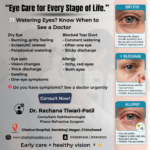What is Myokymia?
Myokymia refers to the involuntary, repetitive contraction of the muscles around the eyelid, most commonly affecting the lower lid of one eye. These twitches are typically mild, painless, and go away on their own after a few minutes, hours, or days. Most people experience them occasionally, and they are not usually a cause for concern.
Common Causes of Eye Twitching
Eye twitching is often triggered by everyday lifestyle factors. Some of the most common causes include:
Stress: Mental or emotional stress can affect your nervous system and trigger muscle spasms, including in the eyelids.
Fatigue and Lack of Sleep: Not getting enough rest can lead to overactive muscles and nerve irritability.
Caffeine and Alcohol: Excessive consumption of stimulants or alcohol can disrupt nerve function.
Eye Strain: Prolonged screen time or reading without breaks can strain the eye muscles.
Dry Eyes: People who wear contact lenses or work in air-conditioned environments may experience dry eyes, contributing to twitching.
Nutritional Imbalances: Deficiencies in magnesium, potassium, or vitamin B12 can sometimes cause muscle spasms.
In most of these cases, lifestyle changes such as reducing screen time, sleeping well, cutting back on caffeine, and managing stress can help reduce or stop the twitching.
When is Eye Twitching a Cause for Concern?
Although most eye twitches are benign, some warning signs may suggest a more serious issue:
Twitching that lasts more than a week
Twitching involving both eyes or other areas of the face
Eyelid drooping (ptosis) or complete eye closure during a spasm
Vision changes, double vision, or difficulty opening the eye
Spasms in other facial muscles, such as the mouth or cheek
These symptoms may point to neurological conditions like blepharospasm, hemifacial spasm, or even more serious disorders like Multiple Sclerosis or Parkinson’s disease. If you experience any of these signs, it’s important to consult an eye specialist immediately.
How is Eye Twitching Treated?
In most cases, no specific treatment is required for eye twitching. Managing stress, improving sleep, and limiting caffeine usually help. If dry eyes are contributing, lubricating eye drops may provide relief. For persistent or severe cases, a doctor may recommend:
Prescription eye drops
Botox injections to relax the muscles
Blood tests to check for deficiencies
Neurological tests if a serious condition is suspected
Contact us on 9168690448 / 9158681123
Website – www.chetnahospital.co.in
Address – Chetna Hospital, Sambhajinagar, MIDC, G Block, Near Rotary Club, Chinchwad 411019
.
.
.
#hospital#pune#pcmc#chinchwad#medical#medicalservices#dryeyetreatment#dryeyerelief#dryeyedisease#dryeyetherapy#catract#catractsurgery#catracteyesurgery#catracteyeoperation#eyedoctor#eye#glaucoma#conjunctivitis#ophthalmologist#eyediseases#eyepain#pinkeye#hazeleyes#myopia#eyeinfection#amblyopia#dryeyesyndrome#eyeproblems#motibindu#motibinduoperation













